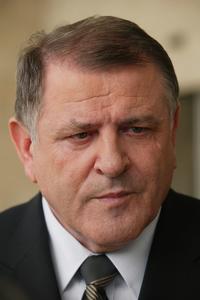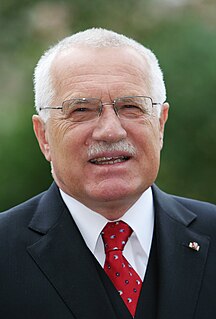Politics of Slovakia takes place in a framework of a parliamentary representative democratic republic, with a multi-party system. Legislative power is vested in the parliament and it can be exercised in some cases also by the government or directly by citizens.

Vladimír Mečiar is a Slovak politician who served as the prime minister of Slovakia three times, from 1990 to 1991, from 1992 to 1994 and from 1994 to 1998. He was the leader of the People's Party - Movement for a Democratic Slovakia (ĽS-HZDS). Mečiar led Slovakia during the dissolution of Czechoslovakia in 1992–93 and was one of the leading presidential candidates in Slovakia in 1999 and 2004. He has been criticized by his opponents as well as by Western political organisations for having an autocratic style of administration and for his connections to organized crime and his years in government became infamously known as Mečiarizmus.

Mikuláš Dzurinda is a Slovak politician who was the prime minister of Slovakia from 30 October 1998 to 4 July 2006. He is the founder and leader of the Slovak Democratic Coalition (SDK) and then the Slovak Democratic and Christian Union. From 2002 to 2006, his party formed a coalition government with the Christian Democratic Movement, the Alliance of the New Citizen and the Party of the Hungarian Coalition. Mikuláš Dzurinda's 2nd government was labelled as a reformist one, pro-market and most effective one in economic matters in Slovakia since 1993. Carried out reforms included flat tax 19%, pension reform, education financing reform. During his term Slovakia joined both the European Union and NATO.

The Movement for a Democratic Slovakia was a national-populist political party in Slovakia. The party is commonly considered as authoritarian and illiberal.

The Christian Democratic Movement is a christian democratic political party in Slovakia that is a member of the European People's Party (EPP) and an observer of the Centrist Democrat International.
The Alliance of the New Citizen was a liberal political party in Slovakia existing from 2001 to 2011. The acronym was a pun on áno, Slovak for "yes". It was founded and led by media entrepreneur Pavol Rusko. The party positioned itself as liberal and was a member of international liberal organisations. It was part of the centre-right governing coalition of Prime Minister Mikuláš Dzurinda from October 2002 to September 2005.

Ivan Gašparovič is a Slovak politician and lawyer who was third president of Slovakia from 2004 to 2014. He was also the first and currently the only Slovak president to be re-elected.
Public Against Violence was a political movement established in Bratislava, Slovakia in November 1989. It was the Slovak counterpart of the Czech Civic Forum.

Parliamentary elections were held in Slovakia on 25 and 26 September 1998. The elections resulted in the defeat of the Vladimír Mečiar government and the election of Mikuláš Dzurinda as Prime Minister. His party, the Slovak Democratic Coalition formed a coalition government with the Party of the Democratic Left, Party of the Hungarian Coalition, and the Party of Civic Understanding.

Parliamentary elections were held in Slovakia on 30 September and 1 October 1994. The early elections were necessary after the Vladimír Mečiar 1992 government had been recalled in March 1994 by the National Council and a new temporary government under Jozef Moravčík had been created at the same time.

Parliamentary elections were held in Slovakia on 5 and 6 June 1992 alongside federal elections. The Movement for a Democratic Slovakia emerged as the largest party, winning 74 of the 150 seats in the National Council and forming a minority government under Vladimír Mečiar. The threshold had been raised from 3% to 5%.

Michal Kováč was the first president of Slovakia, having served from 1993 through 1998.
Marin Fronc is a Slovak politician and former Minister of Education of Slovakia. He studied at Comenius University in Bratislava at Faculty of natural sciences. His studies were focused on mathematics. His academic career continued at University of Transport and Communications in Žilina where achieved several academic titles. He entered politics in 1989 as a member of Christian Democratic Movement and after elections in 2002 he became Minister of Education of Slovakia. Martin Fronc is married and he has three children.

The 2009 European Parliament election in Slovakia was the election of the delegation from Slovakia to the European Parliament in 2009.
A referendum in Slovakia was held on 23 May and 24 May 1997. Voters in Slovakia were asked four separate questions: on whether the country should join NATO, whether nuclear weapons should be allowed in Slovakia, whether foreign military bases should be allowed in Slovakia, and whether the President should be elected directly. The government left the last question off the ballot paper, leading to both referendums failing to meet the legally required turnout threshold.

Federal elections were held in Czechoslovakia on 5 and 6 June 1992, alongside elections for the Czech and Slovak Assemblies. The result was a victory for the Civic Democratic Party–Christian Democratic Party (ODS-KDS) alliance, which won 48 of the 150 seats in the House of the People and 37 of the 150 seats in the House of Nations. Voter turnout was 84.7%.
Privatization in Slovakia occurred primarily in the 1990s as a result of the Velvet Revolution in 1989 and after the creation of Slovak Republic in 1993 due to the splitting of Czechoslovakia. While the Czech Republic, under the leadership of President Václav Havel and Prime Minister Václav Klaus, has emerged as a favorite for Western investors and entrepreneurs, Slovakia under autocratic Prime Minister Vladimír Mečiar struggled with the transition.

František Šebej is a Slovak politician and academic. He was member of the National Council of Slovakia between 1998 and 2002 and once more from 2010 until 2018. Between 1990 and 1992 he was member of the House of the Nation of the Federal Assembly of Czechoslovakia.
Life – National Party, formerly known as Christian Democracy – Life and Prosperity - Alliance for Slovakia, is a Christian democratic political party in Slovakia.
The Christian Union is a Slovak right-wing conservative political party based on the values of the Judeo-Christian tradition. The chairwoman of the party since 2019 is Anna Záborská. At present, he has five deputies of the National Council of the Slovak Republic, elected on the candidate of the party OĽANO-NOVA-KÚ-ZZ.













